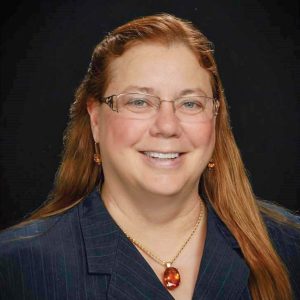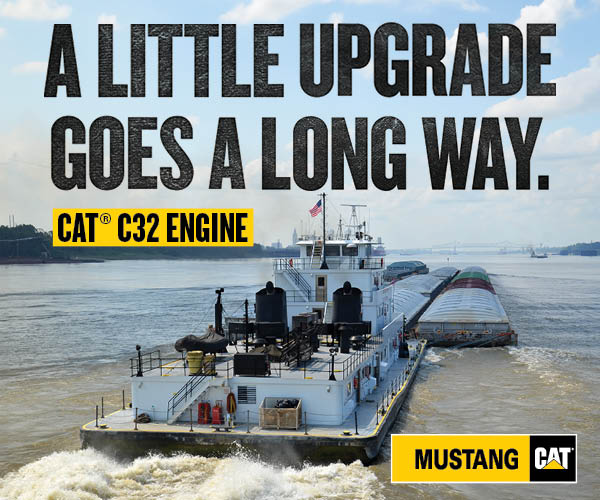Lynn Muench, Longtime AWO Vice President, Honored At Retirement

Lynn Muench, senior vice president of regional advocacy for The American Waterways Operators, is retiring this month after a distinguished 25-year career of service to the waterways industry, 23 of them with AWO.
Muench received the Army’s Commander’s Award for Public Service in a surprise ceremony following the River Industry Executive Task Force (RIETF) meeting April 11 in Baton Rouge, La. Brig. Gen. Kimberly Peeples, commander of the Mississippi Valley Engineer Division, presented Muench with the award, which recognizes individuals who have made significant contributions to the community in partnership with the Army. Among other duties, Muench served as staff for the RIETF for two decades.
A recent tribute in AWO’s newsletter by AWO President Jennifer Carpenter noted that over the years, Muench has led the way in many of AWO’s key initiatives.
Muench told The Waterways Journal recently that she was especially proud of three achievements.
In her work with RIETF, Muench early on worked side by side with AWO members, Coast Guard and Corps of Engineers leaders to keep the rivers open for navigation through all manner of challenges, from historic droughts to historic floods. Muench remembers that she had to hit the ground running.
When she first joined AWO in April 2001, each Marine Safety Unit had its own action plan, but the plans were not coordinated across regions. “The plans had different phases, different lists of contacts, and used different terms,” she said. Muench helped teams of industry and Coast Guard partners who hammered out a set of unified Waterways Action Plans for most regions of the Western Rivers, with standardized steps and procedures.
The improved WAPs were forged in fire. In 2005, Hurricane Katrina had exposed flaws and gaps in the communications necessary between local, state and federal agencies and the waterways industry in emergencies. Just before that, a serious accident had resulted in four fatalities and fed demands from state legislatures for more state-level regulation of the waterways operations.
Muench and her team worked closely with Capt. Tim Close, who was chief of the Western Rivers, a Coast Guard position that had been created when the Coast Guard’s Second District, based in St. Louis and responsible for the Upper Mississippi and Ohio rivers, was consolidated with the Eighth District, based in New Orleans. (Coast Guard sectors now report directly to the chief of staff.) The WAP working group hammered out common designations for stages, common steps to take, people to contact and equipment to mobilize in the events of high water, low water, storms, ice and other emergencies. “The plan was completed in about a year,” Muench remembered. “It reshaped how everyone communicated and helped avoid state laws and Coast Guard regulations.”
Breaking Bread
Muench remembers that not everyone in the industry embraced the idea of working closely with the Coast Guard—at first. “We had many people who were nervous about that, because they thought the Coast Guard just wanted to regulate us. I told them, ‘Look, if we don’t get together with them and address these incidents, the states are going to do it, and neither we nor the Coast Guard will like it.’ ”
“I had been reading a book about the importance of sharing meals,” she said. “It had to do mainly with families, but part of it dealt with work relationships. It said that any time you break bread with someone, the relationship changes. I had never thought about that before. But after that, I suggested that AWO staff host at least two MSU lunch meetings a year with their Coast Guard commanders and their senior staff in their regions. Those meetings were especially important because the commanders would bring their staffs—the young, ambitious first lieutenants who not only performed much of the office’s work, but who would one day be admirals.”
“We have good relationships with a lot of admirals today who remember those early lunch meetings,” Muench added.
Another important effort Muench led was organizing AWO’s response to state-level challenges to the industry. Threats to the industry sometimes emerge from statehouses as well as from Congress. State threats to the industry are increasing in frequency, she said.
Finally, Carpenter credited Muench with one of the AWO’s signature events—hosting members of Congress and their staffs on towboat and tugboat tours. It helps key decision-makers to meet industry members and see first-hand what goes into making our maritime transportation system work and learn what value it brings to the nation, along with environmental benefits. The tugboat/towboat tours are a mainstay of AWO’s educational efforts today and one of its most effective educational tools.



